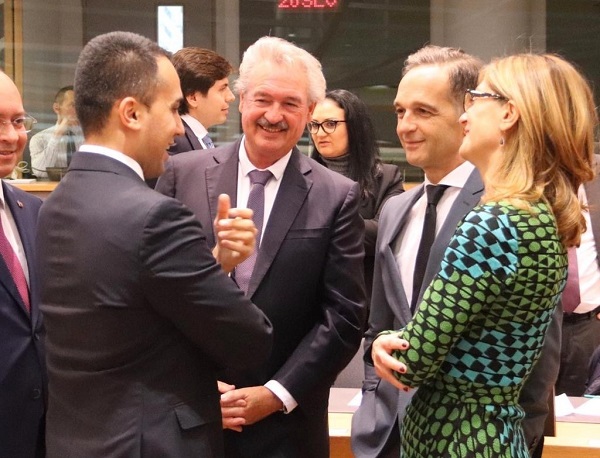 L-R: Luigi di Maio, Italy's Minister of Foreign Affairs; Jean Asselborn, Luxembourg's Minister of Foreign Affairs; Heiko Maas, Germany's Minister for Foreign Affairs; Ekaterina Zaharieva, Bulgaria's Minister for Foreign Affairs;
Credit: MAEE
L-R: Luigi di Maio, Italy's Minister of Foreign Affairs; Jean Asselborn, Luxembourg's Minister of Foreign Affairs; Heiko Maas, Germany's Minister for Foreign Affairs; Ekaterina Zaharieva, Bulgaria's Minister for Foreign Affairs;
Credit: MAEE
Luxembourg's Minister of Foreign and European Affairs, Jean Asselborn, participated in the EU Foreign Affairs Council and the Benelux Committee of Ministers, both of which took place in Brussels yesterday.
The Foreign Affairs Council, chaired for the first time by the new High Representative of the Union for Foreign Affairs and Security Policy and Vice President of the European Commission, Josep Borrell Fontelles, began with a debate on current international affairs. On the agenda were relations with Russia and efforts to implement the Minsk agreements to end the conflict in Ukraine, the latest developments in Bolivia, Libya, the Republic of Moldova and Hong Kong, as well as the Iranian nuclear issue.
The ministers then held a policy debate on EU-Africa relations with a view to preparing for the EU-African Union ministerial and summit meeting in 2020. Welcoming the importance attached to relations with the African continent and the desire to modernise the EU-Africa partnership, Jean Asselborn stressed that "the priorities defined in 2017 at the Abidjan Summit are still relevant and need to be deepened". He recalled Luxembourg's longstanding involvement in Africa, particularly in the Sahel, especially in terms of official development assistance, to which it devotes 1% of its gross national income.
Minister Asselborn also emphasised the importance Luxembourg places on climate action: "Climate change is a multiplier of risks and threats that must be better taken into account if we want to act in a sustainable way on the root causes of insecurity in Africa and in particular in the Sahel, where we are all very committed, and rightly so".
In addition, Jean Asselborn informed his counterparts of Luxembourg's decision to contribute to the emergency transit mechanism (ETM) by resettling refugees from Niger who were detained in inhuman conditions in Libya. In this regard, he recalled the commitment made by the EU to its African partners at the Valletta Summit in 2015 and the need to create legal, safe and accessible migration routes.
Ministers then took stock of EU action and priorities to promote and protect human rights on the eve of International Human Rights Day, which is celebrated every year on 10 December. Jean Asselborn emphasised the role of human rights at the heart of the EU and expressed Luxembourg's support for the rapid establishment of the horizontal regime for EU sanctions in the case of human rights violations, originally proposed by the Netherlands. Minister Asselborn also supported the initiative of Sweden and France, which proposes to strengthen the impact of the EU's external action in favour of gender equality.
Under miscellaneous, ministers discussed the stalemate in the Middle East peace process. Referring to the letter he sent to the new High Representative on 1 December, Minister Asselborn proposed to launch a debate in the EU on the desirability of recognition of the State of Palestine by all its member states. High Representative Josep Borrell Fontelles has indicated that he intends to organise such a debate, in the context of a discussion on the contribution that the EU can make to the settlement of the Israeli-Palestinian conflict, in the framework of the next meeting of the Foreign Affairs Council in January 2020.
During their informal lunch, the Foreign Ministers had an exchange of views on the working methods of the Foreign Affairs Council. On this occasion, Josep Borrell Fontelles shared his analysis and ideas for boosting the efficiency of foreign and security policy in the coming years.








